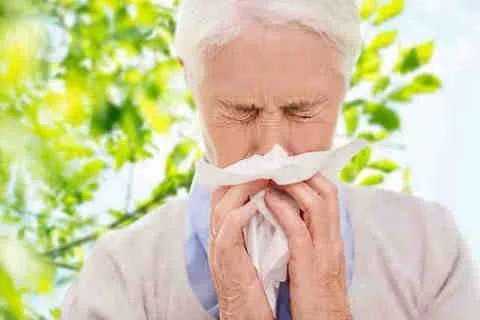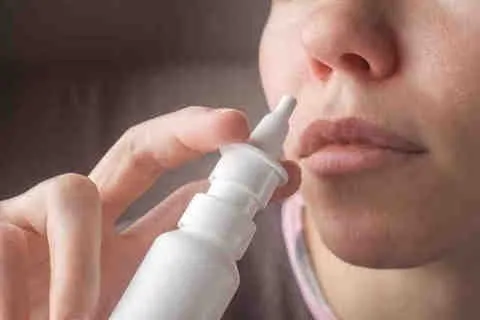
Winter Joys and Woes: Avoid These 23 Mistakes When Battling a Cold
The snowy season brings joy with activities like sipping hot chocolate, constructing snowmen, and celebrating the holidays. However, one downside to this frosty time is the prevalence of the common cold. The cold weather accompanying winter tends to weaken your immune defenses, making it easier for the rhinovirus to invade your body as soon as temperatures decline. So, what steps should you take if this virus manages to infiltrate your system? To begin with, there are 23 actions you should avoid to prevent worsening your cold and to protect others from falling ill as well.

23 Worst Things You Can Do If You Have A Cold

1 Not Get Enough Sleep
When you catch a cold, your antibodies must exert extra effort to combat the infection and help you recover. However, lack of adequate sleep undermines your immune system’s capacity to function effectively. According to a study featured in the journal Sleep, sleeping fewer than seven hours can significantly weaken the immune system. Even if you’re not currently suffering from a cold, maintaining healthy sleep habits is crucial. Additional research has indicated that individuals who consistently fail to get sufficient sleep are at a higher risk of contracting the rhinovirus.

2 Stress Out
When the rhinovirus infiltrates your system, try to remain calm and composed. The American Psychological Association highlights that stress can significantly undermine the immune system’s effectiveness, making it more challenging for the body to combat harmful bacteria and viruses. This is particularly true in older adults, where stress can have a more pronounced effect on weakening the body’s defenses.

3 Not Drink Enough Water
Doctors advise consuming at least eight glasses of water daily for a good reason. Water intake is crucial because without adequate hydration, you are at risk of becoming dehydrated. Dehydration can significantly impede your body’s natural defense mechanisms. When your body lacks sufficient water, it struggles to fend off infections effectively. This is because dehydration limits the secretion of antimicrobial proteins into your saliva, which are essential for protecting your body against harmful microbes.

4 Smoke
If your cold is causing you to cough up various foreign substances, then smoking will only exacerbate your symptoms. “When you smoke, you’re irritating and damaging your lungs,” Neelam Taneja-Uppal, MD, an infectious disease specialist, shared with Everyday Health. When you are suffering from a cold, your lungs are already exerting extra effort to eliminate the infection, and introducing cigarette smoke only hinders their ability to function effectively. This added stress is the last thing your lungs need as they strive to recover and clear the infection from your body.

5 Booze
If you think you might be developing a cold, it’s wise to cancel any upcoming plans that involve drinking large quantities of alcohol—or any alcohol, for that matter. Alcohol can have a negative impact on your health, especially when your immune system is already compromised. Even if you aren’t someone who drinks often, research published in the journal Alcohol reveals that consuming a substantial amount of alcohol in just one evening can severely hinder your immune system’s effectiveness in fighting off illnesses.

6 Exercise Too Hard
While you may be tempted to continue with your rigorous workout routine despite having a minor cold, maintaining such an intense gym schedule when you’re under the weather might actually extend the duration of the illness and potentially worsen it. This is highlighted in a study featured in the International Journal of Sports Medicine. The positive aspect? That same study revealed that when compared to both vigorous exercise and complete inactivity, engaging in moderate physical activity is the most effective approach for combating the common cold. This means you can still visit the gym and exercise at a gentler pace while on the mend.

7 Take Antibiotics
Antibiotics, by definition, are drugs designed specifically to combat infections caused by bacteria. In contrast, the rhinovirus, which is responsible for the common cold, is viral in nature. Consequently, antibiotics are ineffective in treating the common cold. Moreover, the unnecessary use of antibiotics can lead to antibiotic resistance, meaning that when you actually require them for a bacterial infection in the future, they might not be as effective.

8 Blow Your Nose with Excess Force
Research featured in the journal Clinical Infectious Diseases highlights that blowing your nose with excessive force can inadvertently push mucus into the sinuses, potentially leading to a sinus infection. To avoid this, it is recommended that when you blow your nose, you should do so with care and gentleness, focusing on clearing out one nostril at a time to minimize any risk.

9 Blow Your Nose Too Often
Frequent nose blowing can be as harmful as using excessive force when blowing your nose. Experts from the University of California at Berkeley indicate that overusing tissues can lead to the rupture of small blood vessels in the nasal passage, potentially resulting in nosebleeds. This is particularly true if the mucosal lining is already inflamed or irritated due to a cold or other respiratory issues.

10 Cough Into Your Hand
When a coughing fit arises in a crowded, public area, the natural instinct for most individuals is to use their hand as a shield to cover their mouth, aiming to stop the spread of germs. Although this action is well-intentioned, the unfortunate truth is that coughing into your hand is actually more detrimental than simply releasing it into the air. This is because the rhinovirus, responsible for causing colds, survives longer on surfaces than it does when airborne.

11 Use the Machines at the Gym
For the well-being of others around you, it is advisable to refrain from using any of the gym equipment or machines until you are sure that your cold has completely cleared up. Dr. Richard Besser, the author of Tell Me the Truth, Doctor: Easy-to-Understand Answers to Your Most Confusing and Critical Health Questions, shared with Health that if you would prefer not to have the individual next to you on the treadmill or the one who uses the elliptical right before you to be sneezing, coughing, and wiping their nose, then you should consider doing your fellow gym-goers a favor by opting for a lighter workout at home instead.

12 Eat Sugary Sweets
No one likes the idea of giving up their beloved candies and baked treats, but you may need to consider it—at least temporarily—if you’re determined to completely shake off your cold. Why is this necessary? “Sugar leads to inflammation, which has been found to reduce immunity by impairing the function of white blood cells,” Jeanette Kimszal, RDN, NCL, shared with Eat This, Not That! “These particular cells play a crucial role in combating infections.”

13 Wash Your Hands Too Much
While doctors advise frequent hand washing during the cold and flu season to help fend off bacteria, overdoing it can actually compromise your immune system, making you more susceptible to falling ill and having prolonged sickness. A study conducted by the University of Michigan School of Public Health revealed that children with elevated levels of soap-based chemicals in their bodies were more prone to developing allergies. This research supports the “hygiene hypothesis,” which suggests that residing in overly sterile environments can weaken your immune response and hinder your body’s ability to effectively combat infections.

14 Travel
“If you’re dealing with a cold that resists management through over-the-counter medications, it’s best to avoid flying altogether,” advises Jeffrey Linder, M.D., an associate physician at Brigham and Women’s Hospital in Boston, as reported by Condé Nast Traveler. Flying while ill doesn’t just pose a risk to other passengers; it also ensures a highly uncomfortable experience for you (think: painfully blocked ears that could last for days), making the potential outcomes not worth the inconvenience.

15 Drink Orange Juice
Contrary to popular belief, consuming orange juice can be more detrimental than beneficial for treating the common cold. The high acidity level of orange juice can exacerbate the irritation of your throat by burning the already sensitive membranes when you are unwell. This can lead to increased discomfort rather than relief.

16 Drive
The combination of insufficient sleep and drowsiness caused by medication makes driving while suffering from a cold a particularly poor choice. The National Highway Traffic Safety Administration reported that in 2013, drowsy driving was responsible for approximately 72,000 crashes and about 44,000 injuries. To ensure your safety and the well-being of others, consider opting for an Uber or using public transportation if it is essential for you to travel while feeling unwell.

17 Not Consume Vitamin C
While it might be wise to avoid orange juice when you’re battling a cold, this doesn’t mean you should reduce your vitamin C consumption. In fact, maintaining a healthy intake is crucial. Researchers at the University of Helsinki discovered that individuals who took eight grams of vitamin C daily were able to reduce the length of their illness by an impressive 19 percent.
If you’re wondering which foods are rich in vitamin C, there are plenty of options to consider. High doses of this essential vitamin can be found in various foods such as green and red peppers, kale, and broccoli, all of which are excellent choices to boost your intake.

18 Or Zinc
When you’re not feeling your best and are under the weather, it’s important to ensure you’re getting an adequate amount of essential nutrients, one of which is zinc. Research highlighted in the journal Open Forum Infectious Diseases indicates that individuals who use zinc acetate lozenges when they have a cold experience recovery at a rate three times quicker than those who do not utilize these lozenges. This suggests that zinc can play a significant role in enhancing the body’s ability to combat symptoms and assist in a speedier recovery process.

19 Or Probiotics
To effectively curb a cold before it worsens, it’s essential to significantly increase your probiotic consumption as your body strives to regain its health. But why is this important? Researchers at the University of Medicine and Dentistry of New Jersey conducted a study on illness rates among college students and discovered that those who incorporated probiotics into their routine experienced symptoms that were 34 percent less intense. Additionally, their colds lasted two days less than those who did not consume any probiotic supplements.

20 Be Pessimistic
When you catch a cold, the way you decide to view your situation can significantly influence whether you recover swiftly or endure a prolonged period of discomfort. Remarkably, a study supported by the National Institute of Mental Health reveals that individuals who maintain an optimistic outlook are less prone to experiencing the usual signs and symptoms that accompany the common cold, even when they have contracted the virus. This suggests that a positive mindset can potentially play a crucial role in how our bodies respond to such infections.

21 Skip Breakfast
While breakfast is consistently crucial, it becomes particularly essential when it comes to warding off a cold. Researchers at Cardiff University conducted a study on individuals affected by the rhinovirus and discovered that a significant factor influencing whether their participants fell ill was the frequency with which they consumed breakfast. Eating a nutritious morning meal appeared to play a crucial role in boosting their immune systems and potentially preventing the onset of symptoms.

22 Use Too Much Nasal Spray
Exercise caution when it comes to excessive use of nasal spray for a congested nose. Overuse can lead to a condition known as the rebound phenomenon. In this situation, the blood vessels in your nasal passages become resistant to the effects of the nasal spray, resulting in increased congestion. This can cause your nasal passages to become even more blocked than before, ultimately worsening the problem.

23 Go to Work
Even if you’re reluctant to acknowledge that you’re catching a cold, it’s unfair to bring it to the workplace, exposing your colleagues to germs through coughing and sneezing. When symptoms begin to appear, you may remain contagious for three days to a week, so it’s crucial to be mindful. Make an effort to cover your mouth with your arm when you cough, use a tissue when you sneeze, or, if possible, stay home from work to prevent spreading the illness to others.
For even more incredible insights on living your best life, click here to follow us on Instagram and stay updated with our latest tips and inspiration!





